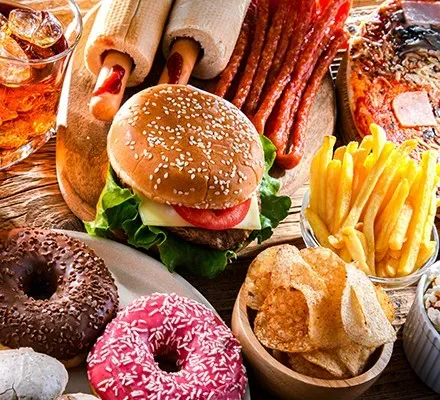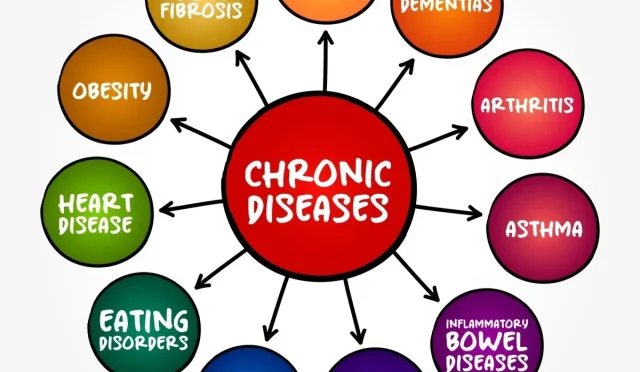Ultra-Processed Foods: Surprising Truths You Should Know
Ultra-processed foods (UPFs) have become increasingly prevalent in modern diets, yet their consumption is linked to alarming health effects that cannot be ignored. Numerous studies indicate that diets high in UPFs can lead to serious health issues, including increased rates of obesity, heart disease, and certain cancers. With the average American consuming about 57% of their diet from UPFs, it’s crucial to understand the dangers of processed foods and how they undermine our overall well-being. This growing awareness has prompted many to explore ways to reduce ultra-processed foods in their meals while reaping the benefits of whole foods, which provide essential nutrients and support a healthier lifestyle. As we navigate the complexities of dietary changes to avoid UPFs, understanding the implications of our food choices has never been more vital.
The conversation surrounding highly processed food items often revolves around their alarming impact on health and wellness. Many consumers are beginning to question the role that these manufactured products play in their diets, as research increasingly reveals their association with chronic diseases. To combat the rising prevalence of processed food dangers, there is a movement toward embracing whole food alternatives that can fortify our nutritional health. As we seek effective methods for cutting back on these synthetic dietary components, understanding how to reduce ultra-processed foods becomes a key part of establishing a balanced eating regimen. Exploring culinary choices rich in natural ingredients can transform our approach to nutrition, enhancing both flavor and vitality.
Understanding Ultra-Processed Foods: What They Are and Why They Matter
Ultra-processed foods (UPFs) are defined within a specific classification called the Nova system, which categorizes foods based on the extent and purpose of their processing. UPFs are primarily composed of substances derived from whole foods or manufactured in laboratories, and they often contain additives like preservatives, colorings, flavor enhancers, and emulsifiers. These foods are designed to be highly palatable and have a long shelf life, which contributes to their prevalence in the American diet. The concerning reality is that the average American’s dietary intake consists of a staggering 57 percent UPFs, presenting serious implications for health and nutrition.
The health effects of ultra-processed foods are a growing concern among scientists and nutritionists alike. Studies suggest that high consumption of UPFs is linked to numerous health issues, including obesity, cardiovascular diseases, and various types of cancers. These foods are typically energy-dense and low in essential nutrients, which can lead to overeating without providing the necessary micronutrients for health maintenance. With the rapid growth of UPFs within the global food supply, understanding their components and their potential impact on our health has never been more crucial.
The Striking Health Effects of Ultra-Processed Foods
Research has increasingly highlighted the health implications associated with ultra-processed foods. Specific concerns include links to cognitive decline, chronic diseases, and even premature death. A recent investigation led by scientists at Harvard indicates that excessive UPF consumption may contribute significantly to chronic inflammation, which is a precursor to numerous diseases. The high levels of sugars, unhealthy fats, and sodium found in many of these products can increase cravings and influence eating behaviors negatively, making individuals more susceptible to weight gain and obesity-related health problems.
Moreover, emerging studies suggest that the synthetic additives commonly present in UPFs may have detrimental effects on gut health. Ingredients like emulsifiers can disrupt the natural microbial balance in the gut, leading to issues such as impaired digestion and increased inflammatory responses. As the knowledge surrounding the health effects of ultra-processed foods continues to evolve, consumers are urged to be more discerning about their food choices and aware of the potential risks associated with these products.
How to Reduce Ultra-Processed Foods from Your Diet
Reducing ultra-processed foods from your diet doesn’t have to be a daunting task. One effective approach is to focus on gradual dietary changes, such as incorporating more whole foods into your meals. Whole foods, like vegetables, fruits, whole grains, and lean proteins, provide the nutrients your body needs without the added sugars, unhealthy fats, and preservatives often found in UPFs. Consider meal prepping with fresh ingredients, which can help you avoid the convenience of pre-packaged options that are usually ultra-processed.
Another strategy for cutting back on UPFs involves being vigilant about food labeling. Reading ingredient lists can help identify the presence of additives and the overall processing level of a product. Aim to choose items with few, recognizable ingredients, as these are often less processed. Additionally, learning to cook simple meals at home can significantly decrease reliance on ultra-processed options. By embracing cooking and meal preparation, you can create nutritious, balanced meals that support your health and wellness goals.
The Benefits of Whole Foods vs. Ultra-Processed Foods
Transitioning to a diet rich in whole foods presents numerous benefits that can enhance overall health and well-being. Whole foods, such as fresh fruits, vegetables, nuts, and whole grains, provide essential nutrients, vitamins, and minerals that ultra-processed foods often lack. Researchers have found that diets high in whole foods can lead to improved energy levels, better metabolic function, and lower risks of chronic illnesses, including heart disease and diabetes. Furthermore, the high fiber content in whole foods contributes to increased satiety, which can be a natural deterrent to overeating.
In contrast to ultra-processed foods, whole foods are more aligned with nutritional needs and tend to maintain their integrity during preparation. Studies indicate that whole foods provide health benefits that go beyond basic nutrition, often leading to improved mood and cognitive function. By prioritizing whole foods in your diet, individuals can cultivate a healthier relationship with food, resulting in holistic health improvements over time while minimizing the associated dangers of processed diet patterns.
Navigating Supermarket Aisles: Choosing Wisely
Facing the overwhelming choices in supermarket aisles can be daunting, especially when trying to avoid ultra-processed foods. One way to navigate this challenge is to shop primarily around the perimeter of the store, where whole foods like fresh produce, dairy, and meats are typically located. The center aisles often contain a high concentration of ultra-processed snacks, beverages, and convenience meals that, while alluring, pose health risks. Making a grocery list beforehand based on whole food options can also streamline the shopping process and reduce impulsive purchases.
Additionally, technology can be beneficial in making healthier choices while grocery shopping. Applications such as Yuka allow consumers to scan barcodes and receive immediate feedback on the potential health risks associated with a product’s ingredients. This instant access to information helps consumers to make informed decisions about their food purchases, steering them toward healthier, whole food alternatives while steering clear of ultra-processed options that might compromise their health.
The Role of Additives in Ultra-Processed Foods
One of the defining characteristics of ultra-processed foods is the inclusion of a variety of additives, which serve multiple purposes such as preservation, flavor enhancement, and texture improvement. Common additives like artificial sweeteners, emulsifiers, and preservatives are often included to create products that are more appealing and longer-lasting. However, the health implications of these synthetic ingredients are becoming a topic of concern within the scientific community. Some studies suggest that additives may disrupt metabolic regulation and gut health, leading to further complications associated with a diet high in UPFs.
The impact of these additives on overall health raises critical questions about regulatory standards and consumer safety. As we continue to consume more ultra-processed foods loaded with additives, it becomes imperative to investigate their long-term effects on our health. Engaging in consumer advocacy for clearer labeling and better regulations can help shift the food industry toward safer practices while encouraging healthier food production that prioritizes public health over shelf life.
Creating a Healthier Eating Environment
In order to successfully reduce ultra-processed foods in your daily diet, creating a healthier eating environment at home is essential. This entails organizing your kitchen to prioritize whole ingredients, easily accessible fruits, and minimally processed options over junk food. Meal prep options that feature whole foods can be made convenient and enjoyable by cooking in advance, batch-preparing snacks, and keeping healthy ingredients at the front of cabinets and refrigerators. Simple adjustments to your kitchen setup can significantly impact your food choices throughout the week.
Moreover, involving family members or roommates in meal planning and preparation can foster a supportive environment for healthier eating practices. Cooking together can make healthful meals feel less burdensome and more enjoyable while ensuring that everyone is on board with dietary changes. Sharing recipes and trying new whole foods can also inspire creativity and excitement around meals, decreasing reliance on ultra-processed convenience items.
The Psychological Effects of Ultra-Processed Foods
The psychological implications of consuming ultra-processed foods are an area of increasing interest among researchers. Many studies indicate that diets high in UPFs may contribute to mental health issues, including anxiety and depression. The sugar and unhealthy fats prevalent in these foods can affect mood and energy levels, creating a cycle where individuals seek out these comforting foods during stress, further exacerbating their emotional state. This phenomenon makes it crucial to identify alternatives that provide emotional satisfaction without the health risks.
Understanding the connection between food choices and mental health can empower individuals to make better dietary decisions that enhance their emotional well-being. Incorporating whole foods known for their positive effects on mood—such as leafy greens, omega-3 fatty acids, and dark chocolate—can promote better mental health outcomes. By recognizing the psychological effects of ultra-processed foods, individuals can take proactive measures in their diets for a healthier mind and body.
Implementing Dietary Changes to Avoid Ultra-Processed Foods
Implementing dietary changes to minimize or avoid ultra-processed foods requires practical strategies and a commitment to healthier eating practices. Start by conducting a thorough review of your current eating habits. Take note of the UPFs that you commonly consume and look for healthier alternatives that can replace them. Substituting sugary cereals with oatmeal topped with fresh fruit or choosing whole grain bread instead of white bread are simple adjustments that can lead to a significant reduction in ultra-processed foods.
Additionally, setting clear goals for your dietary changes can offer motivation and accountability. Consider implementing a challenge for yourself, such as a week without UPFs, and utilize tracking apps to monitor your food intake. Engaging with supportive online communities or local groups focused on healthy eating can provide encouragement and additional resources. As you incorporate these lifestyle changes, you’ll begin to notice not only a decrease in ultra-processed food consumption but also improvements in your overall health and well-being.
Frequently Asked Questions
What are the health effects of ultra-processed foods that I should be aware of?
The health effects of ultra-processed foods (UPFs) are concerning, as studies link their consumption to issues such as obesity, cardiovascular disease, diabetes, cognitive decline, and various types of cancer. UPFs often contain high amounts of added sugars, unhealthy fats, and preservatives, which can contribute to inflammation and metabolic disorders.
How can I reduce my intake of ultra-processed foods in my diet?
To reduce ultra-processed foods, focus on meal prepping with whole foods such as fruits, vegetables, whole grains, and lean proteins. Choose fresh or minimally processed ingredients, read labels carefully, and make conscious choices at grocery stores by avoiding products high in added sugars and unhealthy fats.
What are the benefits of whole foods compared to ultra-processed foods?
Whole foods provide essential nutrients, fiber, and antioxidants that are often stripped away in ultra-processed foods. These nutrient-rich options promote better digestion, support overall health, and encourage satiety, reducing the likelihood of overeating and contributing to weight management.
What dangers are associated with consuming processed foods and ultra-processed foods?
The dangers of processed foods, especially ultra-processed ones, include increased calorie intake, poor nutrient availability, and higher risks of chronic diseases. UPFs can lead to unhealthy eating patterns, and their additives might cause long-term health issues that are still being researched.
What dietary changes should I consider to avoid ultra-processed foods?
Dietary changes to avoid ultra-processed foods include incorporating more home-cooked meals, choosing organic or minimally processed products, and focusing on whole ingredients. Regularly consuming fruits, vegetables, legumes, and whole grains can help you achieve a balanced diet while minimizing UPF intake.
| Key Point | Details |
|---|---|
| Definition of Ultra-Processed Foods | Lack of a clear definition; generally foods that are made mostly from substances extracted from whole foods or synthesized in labs. |
| Health Risks | Linked to increased risk of diseases such as obesity, heart disease, cancer, depression, and cognitive decline. |
| Diet Composition | UPFs make up about 57% of the average American diet, climbing to two-thirds for children and teens. |
| Nutritional Concerns | Typically high in sugar, unhealthy fats, and sodium; low in fiber, protein, and micronutrients. |
| Impact on Appetite | UPFs can lead to overeating by not satisfying hunger effectively, potentially resulting in weight gain. |
| Tools for Better Choices | Emerging tech tools like True Food and SmartBites to help consumers make informed decisions about their food choices. |
Summary
Ultra-processed foods pose significant health risks linked to various diseases and unhealthy dietary habits. As the evidence mounts against their consumption, understanding what qualifies as these foods, their impact on our health, and learning how to choose better options becomes essential for maintaining a nutritious diet. The ongoing research and development of helpful tools aim to simplify these choices for consumers tackling ultra-processed foods in their diets.
#UltraProcessedFoods #FoodFacts #HealthyEating #NutritionAwareness #EatSmart








